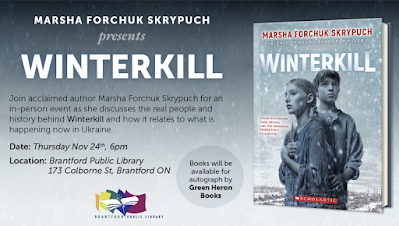Scholastic
978-1-338-831-41-2
288 pp.
Ages 8-13
September 2022
Our way of life was being erased. We had to figure out a way to escape before we were erased too. (pg. 38)
With a war currently raging in Ukraine, it's easy to remember that Ukraine has suffered oppression for centuries. As it sought independence and freedom, the country was repeatedly targeted and made to suffer. Winterkill is but one story of an attempt to quash a people with a strong cultural identity and fervor for autonomy.
In 1930, 12-year-old Nyl Chorny lives on a small farm with his parents and younger siblings Yulia (11) and Slavko (9) in the village of Felivka near Kharkiv. Ukraine is currently under the control of the Soviet Communists led by Stalin whose five-year-plan to modernise the country is really aimed at hurting Ukrainians by eliminating small family farms and combining them under large collectives called kolkhozes. Some villagers are buying into the lies told by Comrades Tupolev and Chort–Russians charged with governing them–and shock workers promising tractors, increased grain, and better opportunities. But for those like Tato, Nyl's father, the collectivisation is just a replacement for landlords and will have nothing to do with them. Still, they must abide by the demands of Communist workers who inventory all their goods, ban religious faith, and requisition their grain with the threat of being labelled kulaks and executed or deported. Some Communists are foreign specialists like Canadian George White who will be working at the future tractor factory and truly believes in Communism as does his young daughter Alice. Others have just found a new way to bully and exert control and gain wealth at the expense of others.
If you want to eat, join the kolkhoz. (pg. 50)
Still the family farms as best they can, managing with less after Nyl's Uncle Illya is executed for being a kulak, and Auntie Pawlina and baby cousin Tanya move in with the family. A bumper crop of wheat, millet and corn in the summer of 1930 has them all hopeful again and the family considers leaving the Soviet Union via Auntie's cousins in Ternopil, a city across the border in Polish Ukraine. But all those dreams go up in smoke when soldiers steal all the grain while the families celebrate the harvest.
Relying on foraging, hunting and fishing for food, and no way to get money needed for travel, Nyl and Slavko steal away to work in Kharkiv where the tractor plant needs construction workers. But what they find there is as dismal as at home though they are able to make some money. Still, what they return home to is worse than they could have expected. Whether any of them will ever survive, much less escape, a genocide by starvation and violence is Nyl's story to tell.
Winterkill is a big story. It is so big that I can't possibly reveal all the details and nuances of Marsha Forchuk Skrypuch's story in a short review. There are good people and evil ones, both Ukrainian and Russian. There is joy and heartache, resourcefulness and laziness, greed and generosity. And there is oppression. Though much of Winterkill deals with the Holodomor, the 1932-1933 genocide of Ukrainians by starvation, it's a story that's bigger than that. It's about that oppression of people and culture. There is resilience, as Nyl demonstrates with his story, but there is death and destruction and horrific suffering. And Marsha Forchuk Skrypuch tells it with such authenticity that
this book of historical fiction could be a biography. Still, she tells it with sensitivity and compassion and allowed this Ukrainian-Canadian to read it with appreciation, albeit filled with sorrow.
🌻🌻🌻🌻🌻
Marsha Forchuk Skrypuch will launch Winterkill at the Brantford Public Library’s downtown branch on Thursday, November 24, 2022, at 6 p.m. Copies of the book will be available for purchase from Green Heron Books for signing by the author.


Thank you for this wonderful review, Helen. This was such a hard book to write!
ReplyDelete